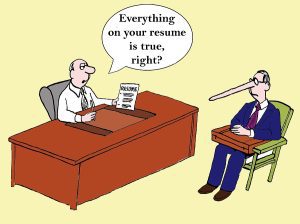This article contains signs that a job candidate could be hiding something in their work history.
Below is a summary of the article. We encourage you to read the article in its entirety.
“Employers rely on candidates to be truthful about their work history. However, some candidates conceal gaps in employment, embellish their responsibilities, or hide the real reasons they left previous positions.
One expert is warning that these deceptions can lead to costly hiring mistakes. David Garcia, co-founder and CEO of ScoutLogic, a bulk background check service that helps HR teams and recruiters conduct comprehensive screening at scale for hospitals, banks, universities, and other major employers, has spent years analyzing hiring patterns and candidate behavior.
“Most candidates are honest about their background, but there are certain patterns that consistently appear when someone is trying to hide something significant,” Garcia explains. “Recognizing these signs early can save employers from making expensive hiring decisions they’ll later regret.”
He lists them below.
- Inconsistent dates and frequent job hopping
Employment gaps happen, but when dates don’t add up or candidates show a pattern of unusually short tenures, it warrants closer examination. Look for overlapping employment periods that seem impossible or roles lasting just a few months with no clear progression.
Short stints aren’t automatically disqualifying, but multiple positions lasting less than a year could suggest performance issues, cultural fit problems, or even dismissals disguised as voluntary departures.
- Vague job descriptions and generic language
When candidates use overly broad terms to describe their responsibilities or provide descriptions that could apply to almost any role, they may be obscuring the truth about their actual duties or level of authority.
“Authentic job descriptions usually include concrete details about projects, team sizes, or measurable outcomes,” Garcia explains. “When everything sounds generic, it often means the candidate either wasn’t deeply involved in meaningful work or is trying to inflate their role.”
- Evasive interview responses
Pay attention to how candidates respond when asked about specific aspects of their work history. Deflecting questions, providing circular answers, or showing discomfort when discussing reasons for leaving previous positions can indicate concealed issues.
“Honest candidates welcome the opportunity to elaborate on their experience,” says Garcia. “When someone consistently redirects conversations away from certain topics or becomes vague when pressed for details, it’s worth investigating further.”
- Missing references or reluctance to provide contacts
References are a candidate’s opportunity to showcase their strengths, so hesitation to provide contacts from recent positions is particularly telling. Watch for candidates who only offer references from years ago, refuse to provide manager contacts, or make excuses about why former colleagues can’t be reached.
Some candidates may claim their previous company has a policy against providing references, but most legitimate employers will at least confirm employment dates and eligibility for rehire.”
James P. Randisi, President of Randisi & Associates, Inc., has been helping employers protect their clients, workforce and reputation through implementation of employment screening and drug testing programs since 1999. This post does not constitute legal advice. Randisi & Associates, Inc. is not a law firm. Always contact competent employment legal counsel. To learn more about the rights of employees who test positive for marijuana, Mr. Randisi can be contacted by phone at 410.494.0232 or Email: info@randisiandassociates.com or the website at randisiandassociates.com



